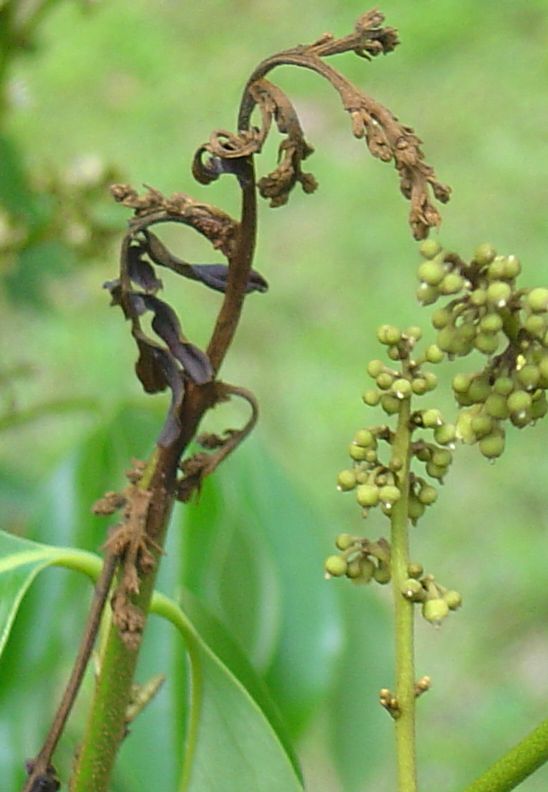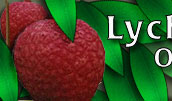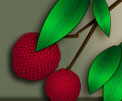Flowering in Lychee Trees
By Krystal Folino and Bill Mee
PART 6: FLOWER PESTS
Flower Pests:
Depending on where in the world lychees are grown there are different pests that affect the flowers. In China lychee brown blight is one of the most serious diseases. This is a fungal pathogen whose spores infect panicles when it is rainy causing them to dry up and turn brown. Anthracnose can damage lychee flowers if we experience heavy rains during the winter which is usually not the case in Florida. Anthracnose can be controlled through the use of approved fungicides; however fungicides can destroy essential soil mycorrhizal fungi that are an important symbiont for lychee tree roots and should probably be avoided..
The most significant pathogen affecting both Australian and Florida lychee growers are flower caterpillars. In Australia there are caterpillars of the moth species Isotenes miserana and Platypeplus aprobola and they feed on the flowers and young fruit.
In Florida the adult webworm moth (Crocidosema sp.). oviposits (lays eggs) on the apical buds of flower panicles or new growth. It is believed that this moth was introduced into Florida from the Caribbean. The eggs hatch and the larvae may bore into the succulent new growth or feed on newly emerging flower parts. Symptoms of damage include webbing of newly emerged panicles or leaves. Very small, recently set fruit (green, pea size) may also be bored into and under close inspection may show an entry hole. The moth populations begins to build up during November and peaks during January and February, which unfortunately peaks during the critical phase of the lychee flowering season.. There are no alternative host plants that this moth feeds on and the population of this pest appears to be coincident with the flowering and flushing cycle of lychees and longans.

Figure 6: Lychee Webworm Damage to a Flower Panicle
Parasitic wasps are being tested for use as a bio-control for this moth species, but most growers are using an insecticide known as Intrepid 2F, which is effective in controlling lepidopteran pest (moths).
Intrepid 2F is manufactured by Dow Agrosciences and has been approved by the EPA for use on lychees and longans. The active ingredient in Intrepid - methoxyfenozide - mimics the natural insect molting hormone, inducing a premature lethal molt of the larvae within hours of ingestion. Intrepid offers extended residual activity of at least 14 days on treated foliage.
Supposedly Intrepid 2F has not demonstrated any toxicological effects to most beneficial insects, mites, and pollinators such as lady beetles, lacewings, parasitic wasps, and bees.
Intrepid 2F has low toxicity to mammals, birds, and fish, but is toxic to aquatic invertebrates. Please remember that a wide variety of invertebrates comprise the inter-related eco-systems of the soil food web and use of topical pesticides may have a very adverse affect on soil health. A certain percentage of what gets sprayed topically ends up in the soil around a tree so you should remember this before using any insecticides.
While you may solve the immediate problem of caterpillar larvae you may be causing serious damage to the environment essential to good root system health..
Another insecticide Admire 2F (imidacloprid) has a similar mode of operation however this compound is highly toxic to honeybees and should not be used on lychees for obvious reasons.
>Go
to the First Chapter: "Part 1: Introduction"
<Return
to Part 5: Flower Pollination
by Bill Mee & Krystal Folino - Lychees Online
Are you a lychee enthusiast? Get your FREE Lychee Idea-Kit or browse hundreds of lychee recipes, photos, tips and articles on eating and growing lychees at the Lychees Online Website
http://www.lycheesonline.com
Webmasters, editors, publishers, press, growers, marketers, etc. are free to reprint this article as long as it's reprinted in its entirety and the signature line remains intact.
Please direct a courtesy copy to info@lycheesonline.com or snail mail it to:
Lychees Online
4778 Stono Links Drive
Hollywood, SC 29449
Related Articles:
Back To Lychee Info
Back To Home Page
|
|
|
Copyright © 1999-2010 Lychees Online
info@lycheesonline.com www.lycheesonline.com (954)648-6020
|

